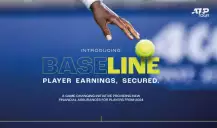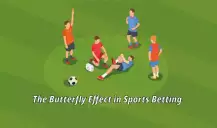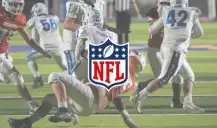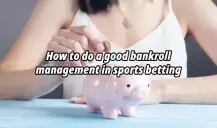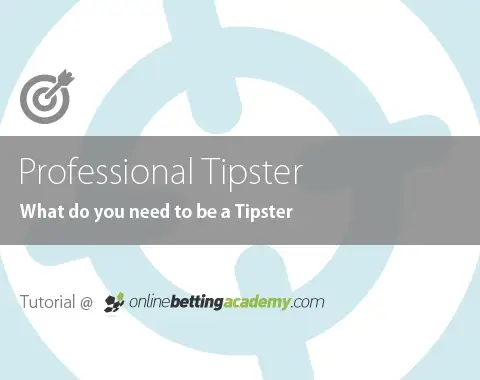
There is no good or bad luck for a tipster: everything is Sports Betting comes down to mathematics.
I this article I'm going to address everything you need to know to become a professional tipster: specialization, minimal and optimal odd lines, bank management, strategy, drawing lines, etc.
If for every action there is a reaction, similarly, for every choice there is a consequence. Understanding that our choices represent who we are is perhaps the basic concept to realizing how a tipster is evaluated by an investor.
If you wish to become a professional tipster, by now you must have realized that sports betting is pure mathematics, since everything is nothing but numbers. There is no luck, good or bad, for us, it's all but odds and variables that change throughout the season. Ask a mathematician if he believes in luck.
If you have realized by now that it's all mathematics, you must also have realized that the most important factors to consider in the beginning of a tipster career are bank management and strategy. Any hasty action executed outside the parameters of the established strategy may lead to bankruptcy. Understanding this is also vital be successful in this profession. That's right! This is a real profession, and a well-paid one if you're efficient, since tipsters are well respected professionals in this business and everyone show look at them in this very same way.
Dotting the i's and crossing the t's, what do you need to become a tipster?
1 Define the market you're going to work with (the sport).
Define the sport you have a better understanding and technical knowledge of. Remember that those who consider themselves specialists in everything, in the end aren't specialists in anything. I work primarily with 2 sports, horse racing and football and I pretty much haven't got much time to do anything else. To work with both sports I had to reduce the number of hippodromes and leagues to a number that wouldn't overwhelm me. Moreover, I know there will come the day in which I'll have to choose one or the other, but until that day comes I'll try to keep working with both.
2 Define the leagues, hippodromes and markets within the sport of your choice.
The previous example is also good to explain this. You need to define the leagues and competitions you're going to be working with. But this isn't a strict rule, I know some people who manage to work well with several leagues and competitions, but that demands a lot of effort to stay up to date, which can be overwhelming for the tipster. But if you get a profit and can handle the pressure, go for it! But my advice is to focus on what you're better at. Focusing on the competitions of one country could be a good option and should work better than working with different competitions from different countries. However, you'll realize you don't always get to choose what you want when working with an investor.
3 Define the value of the odds you're going to be working with.
This is standard in this profession. If you've already chosen a sport, it's time to set the odd average you're going to be working with. In football it's pretty much unanimous that a minimum @1.80 is required... I'm not the only one to say it, it's common knowledge amongst professional tipsters from around the world. Maybe it's possible to have a profit with lower odds, but I would say the minimum should be @1.70, bellow this you're sure to go bankrupt. Remember these are the requirements to become a professional tipster, since investors require these numbers, I'm not talking about an independent bettor working with low odds, I'm talking about the demands of the tipster market, since no investor will hire a tipster who indicates low odds in a sport like football, in which there is always the third option of the tie lurking about.
Maybe in other sports lower odds, or even accumulators, are accepted by investors, if it's possible to prove it's profitable in the long run through reliable data. In horse racing the minimum odd varies according to the market. In the podium market the minimum odd is @2, but in the Win and E/W the minimum odd is @4, but the average should be much higher, since betting with low odds constantly will make it harder to come out of a bad run with your bank intact.
4 Define bank management and strategy
Many bettors have their own differentiated strategies. There is more than one way to do this, but there must always be a mathematical logic behind it. If you have a 24 unit bank, you can't risk 5 units per bet. You need to have a rigorous control of the distribution of units. This is an investment! For example, if you have 300 thousand Euros in your bank, you'll be investing this amount over a period of time, so you need to choose your bets carefully and search for good value odds, since it can have a great impact on your bank later.
But how can you know how many units to bet? It doesn't depend solely on the amount of money in your bank but also on variance. To find it out you must test and register everything and then evaluate it to decide on the best strategy. Moreover, a good strategy is fundamental to resist badruns. I usually increase the stake when going through a bad run. The reason for this is that the more reds I get, the closer I get to winning again. But this requires a rigorous control, not only of the strategy, but also of the emotional control.
5 Define study methods, odd line drawing and how to apply this in betting.
It's not easy to be a tipster , I never said it is. Knowing how to draw odd lines is fundamental for any tipster, but it's not enough to draw odd lines. It has to be done immediately after the previous match ends, to than compare your odds with the ones available in the market, once they become available. You also need to have a study method and apply your knowledge. Basically, you'll define a mathematical equation to do it.
But let me tell you that some people have been in this market for so long that they don't need to use the calculator anymore, they just know by experience at which value the odds are going to become available and are able to make quick adjustments based on recent news about the event. But although it doesn't seem so, they are performing complex mathematical calculations.
In football I see this happen all the time. The most experienced have readily available odd lines, automatically calculated in their minds. In horse racing they wouldn't be able to do that, since the odd line schemes are more complex and there is greater variation, so you need to be constantly looking for patterns, which is a whole different mathematical area. In football the patterns are always there, we apply different weights to the teams if they play at home or away, but it's all a bit predefined. In horse racing there are many horses per race, the conditions are very different in the various hippodromes, etc., so without a mathematical formula it's not possible to succeed in this market. But it's not that hard to find patterns, the identification of such patterns is perhaps the most important thing in horce racing, while in football it's all about applying knowledge of the fair odd lines.
6 Register your numbers.
It's very important to register your numbers, since a tipster needs numbers registered to have credibility. I'm not talking about an Excel spread sheet, but internet sites in which odds are checked. This is key if you wish to work with investors or internet sites.
Remember those tipsters who use Facebook to sell tips? Obviously those aren't the most respected professionals in the business. Every week the flood us with special offers! A serious tipster has his numbers available in a public access site, where the odds can be checked and there is no possibility of manipulation.
The benefits of registering your numbers are numerous: you can be recruited by investors, sites or personal clients.
Therefore, by personalising your actions, taking this seriously and seeing it as an extremely important job in which you can build a career.
I have one last piece of advice: always ask when you have doubts, since this is a complex market in which you need to learn new things every day. If you think you know it all you won't evolve. If possible try to get to know people who work, so you can find out how they do their job and how important decision making is when dealing with psychological tension. Bad decisions have terrible consequences in the long run, remember that.
By becoming a tipster you'll be a more complete bettor, a much better prepared trader in pre-event, a handicapper, an oddmaker, etc... The market is wide and there are many possibilities.
I hope you have enjoyed this article and await your feedback. Ask questions if you have any doubts.
Hugs and good bets everyone!

